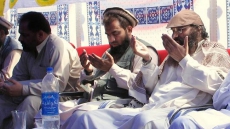WASHINGTON — Americans are a little less likely to ask what they can do for their country these days.
An Associated Press-GfK poll found that the sense of duty has slipped since a similar survey three decades earlier. Civic virtues such as staying informed or serving on a jury don't seem as important as they once did — especially among the younger generation.
The findings fit with research that's been worrying many experts who study civic engagement or advocate for teaching more about civics in school.
"I don't see any recovery," said Rutgers University Professor Cliff Zukin. "The people who were 40 two decades ago aren't as engaged as the people who were 60 two decades ago. This generational slippage tends to continue."
Here are five things to know about Americans' sense of civic duty:
CITIZENSHIP'S NOT WHAT IT USED TO BE
Americans' commitment to some traditional obligations of citizenship has slipped.
An Associated Press-GfK poll repeated questions asked in 1984 about six civic-minded activities: voting, volunteering, serving on a jury, reporting crime, knowing English and keeping informed about news and public issues.
Of the six, only voting and volunteering were embraced about as strongly as three decades ago, when NORC at the University of Chicago posed those questions to Americans on the General Social Survey, but volunteering doesn't rank very high on the list for many.
While just 28 per cent say volunteering is "a very important obligation" that a citizen owes the country, three-fourths of Americans consider voting central to citizenship.
Nonetheless, only about 36 per cent of eligible voters turned out for November's midterms, according to University of Florida Associate Professor Michael P. McDonald's analysis. That's the lowest since World War II.
BUT BIG MAJORITIES STILL FEEL AN OBLIGATION
Despite some sliding, Americans still think U.S. citizenship carries some duties as well as rights.
About 9 out of 10 say that reporting a crime you witness, voting in elections, knowing English and serving on a jury when called are at least "somewhat important" obligations.
And each of those is still rated "very important" by a majority. It's just that, except in the case of voting, those majorities have slipped by an average of about 13 percentage points.
"There are a lot of arguments about how our society has shifted toward a rights focus instead of an obligation focus," said Scott Keeter, director of survey research at the Pew Research Center. But Keeter isn't convinced there's enough evidence to support that conclusion.
"It's a little early to pull the alarm bells about the demise of our civic culture," he said.
SENSE OF DUTY LOWEST IN THE YOUNG
Young people are feeling less dutiful, or maybe just showing their libertarian streak.
In every category except volunteering, adults under 30 were less likely than their elders to see any obligation, and also felt less obliged than young people of the past.
In 2014 about a fourth of them said there's no duty to keep informed, volunteer or speak English.
Young adults felt the most responsibility about reporting a crime: two-thirds said that's "very important," and the rest were divided between "somewhat important" and "not an obligation."
Still, in 1984, their parents' generation was much more devoted to maintaining law and order — 86 per cent of young adults then called reporting crime "very important."
YET VOLUNTEERING GAINED GROUND AMONG UNDER-30 CROWD
Compared to the 1984 survey, Americans' sense of obligation fell across every category and age, save one.
Today's young people are more likely than their parents' generation to consider giving their time for community service "very important."
Nineteen per cent said that three decades ago; 29 per cent think so now.
"That's partly the fact that we have built up our institutions for volunteering," said Peter Levine, associate dean for research at Tufts' Tisch College of Citizenship and Public Service. "Something like 30 per cent of high schools have service learning programs. They didn't have that in the 1980s."
At the same time, the importance of volunteering declined among adults 50 and over compared to their age group 30 years ago.
IS ANYBODY READING THIS?
Americans don't feel much pressure to keep up with news and public issues anymore.
Only 37 per cent think that's very important, down from a majority — 56 per cent — in 1984.
In fact, a fifth say there's no obligation at all to stay fully informed.
The young are even less likely to feel citizens ought to know what's going on, despite having unprecedented amounts of information at their fingertips.






